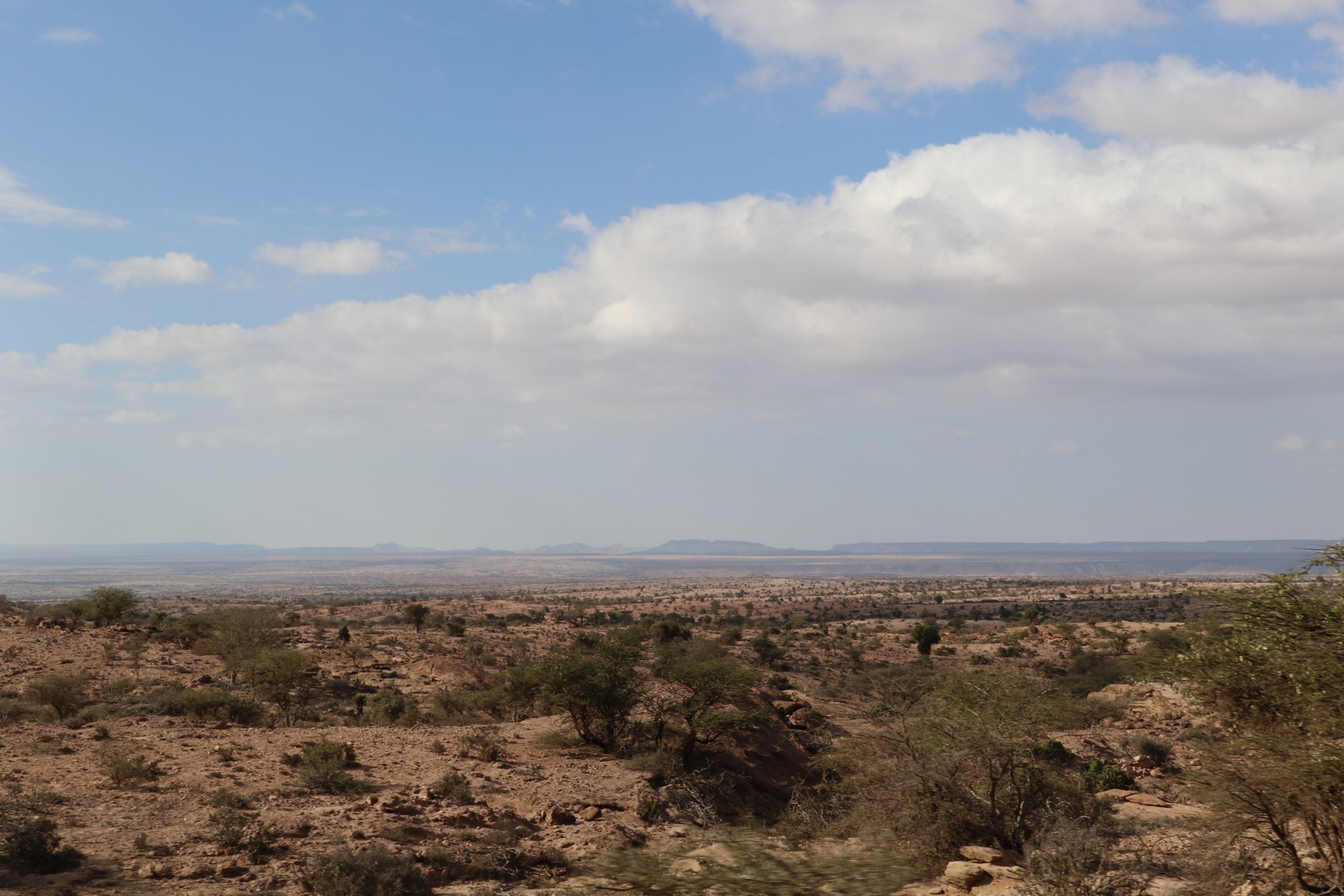Today, the human race and the habitat face imminent danger caused by the irrational actions of humanity. Greed and amassing wealth drive excessive consumption behaviors leading to depletion of natural resources.
Profoundly, the consequences include climate change, fast onset disasters eroding lives and livelihoods. Women, children, older people and those with disabilities and the most vulnerable take the brunt of impact resulting from actions for which they are not largely responsible.
In 2019, the number of affected people reached 93 million, with over 68 million displaced persons – up from 42 million in 2007. The funding requirement to save lives and provide protection topped $22 billion and is ever increasing (OCHA 2019 Global Humanitarian Overview).
Islam and environment
Islam promotes protection of the environment and call for a balanced use of the available natural resources:
‘He raised the heaven and established the balance so that you would not transgress the balance. Give just weight – do not skimp in the balance. He laid out the earth for all living creatures’. Qur’an 55: 7-10.
In another verse, God draws the attention of the human race that their excessive pursuit of economic growth and consumption will have far-reaching negative consequences:
‘Corruption has appeared on land and sea by what people’s own hands have wrought, that He may let them taste some consequences of their deeds, so that they may turn back. Qur’an 30: 41
The consequences are evident: climate-change induced disasters, deforestation, degradation of lands, soil erosion, fragmentation of Earth’s habitat communities and many more.
Islamic Relief’s action on climate change and consumption
In order to raise awareness of the impact of consumption on the environment, Islamic Relief worked in Kenya and Somalia with communities, faith-leaders, schoolchildren, national and sub-national government, and the media.
Kenya
The context
The arid and semi-arid lands (ASAL) in Kenya are prone to the negative impact of the climate change. Over the last one decade, Islamic Relief has been working with communities in Mandera and learned the major contributors to environmental degradation include:
- Overdependence on pastoralism as a source of livelihood causes competition over limited pasture, resulting into overgrazing. This usually also leads to clan conflicts as they migrate in search of pasture and water.
- Charcoal burning and firewood for sale has become a lucrative source of livelihoods which has led to deforestation, impacting negatively on the environment.
- Quarrying activities are also leading to environmental degradation causes in Mandera County.
- Poor waste disposal in settlement areas and towns (especially plastic bottles and plastic packages) is also a big problem.
- Poverty is seen as the main barrier along with entrenched behaviour associated with lack of real local alternatives, e.g. 80 per cent of pastoralists think cutting down trees is normal. Not all of them necessarily understand the effects this practice has on their lives. And if they do understand, they question whether they have an alternative.
How faith leaders were involved in awareness raising

From this, Islamic Relief Kenya facilitated the establishment of a faith based climate change advocacy working group (AWG) to spearhead awareness programmes on climate change and the best mitigation measures. The AWG comprised of 12 men and two women who worked to ensure religious leader engagement in the project.
Islamic Relief Kenya also held a sensitisation forum on existing climate change policy in the Kenya, for 20 faith leaders. This has triggered faith leaders to understand and play a crucial role in the project concerning faith and climate change advocacy in schools and mosques.
Islamic Relief Kenya held an inter-faith workshop to sensitise faith based institutions on climate change and the need for effective mitigation. Organisations included World Vision Kenya, SUPKEM, Council of Imams and Preachers of Kenya and the Mandera mediation council, among others.
Other actions undertaken to raise awareness
Islamic Relief Kenya engaged with six schools (four primary, two secondary) through school environment clubs. Individuals were sensitised and trained on environmental conservation, water use management, energy saving strategies, organic farming and taking care of nature. Some 64 students (37 boys and 27 girls) were trained and now work to disseminate their training to their community.
Islamic Relief Kenya established and promoted ‘environmental conservation champions and ambassadors’ through the environment clubs. They also organised a tree planting day in Mandera, during which 100 seedlings were planted and students learnt the importance of trees in the environment.
Islamic Relief Kenya engaged with the leaders from women’s groups in Mandera County for sensitisation and training on climate change and its negative impacts on lives.
Somalia
The context
Recurrent droughts coupled with protracted conflict are causing catastrophic suffering among vulnerable men, women and children. In the last decade, Somalia has experienced some of the worst drought in the century – including the 2011 famine which claimed the lives of a quarter of a million people, and forced hundreds of thousands from their homes. The 2017 drought displaced over a million persons, driving up the number of IDPs in Somalia to over 2.5 million persons – 20 per cent of the population. The protracted nature of the crisis is still evident today, with deepening vulnerability. The key factors contributing to the environmental degradation include:
- Commercialization of firewood and charcoal. The collapse of law and order in Somalia gave rise is what is termed the war economy. Charcoal is exported from Somalia to the Gulf countries through Mogadishu and other ports such as Kismayo, causing serious levels of deforestation. According to the UN monitoring report (2017), an estimated 100,000 metric tonnes of charcoal with a value of $120 million have been illicitly exported to the Gulf States. The report points out the various stakeholders who profit from this trade.
- Lack of understanding of correlation between environment and sustaining livelihoods of the current and future generations. Communities have limited knowledge on the natural resource managements (NRM) and the impact of deforestation
How faith leaders were involved in awareness raising
Islamic Relief Somalia mobilised some prominent imams in Mogadishu who often have a large audience during Friday sermons. The imams were sensitised on the importance of addressing the impact of climate change.
After securing their buy-in, Islamic Relief Somalia developed and printed an imam’s guide to climate change, which was translated into English and Somali. Imams have subsequently disseminated information provided in the guide in their Friday khutbahs, sermons. Key topics include:
- The Islamic faith perspective on the critical importance of humans as custodians of the Earth and its natural resources.
- Protecting environment from over-exploitation and harmful practices that cause pollution.
- The consequences of inappropriate behaviours.
- Actions that individuals can take to address the issues.
In order to reach out to a large audience, Islamic Relief partnered with national television campaigns. Information and messages on climate change in the imam’s guide was aired on national television and during prime-time on a leading television station, ‘RAJO’.
Other actions undertaken to raise awareness

Islamic Relief Somalia led a teachers workshop, ‘Teachers for agents of change’. Teachers were sensitised on the effects of climate change and developed action plans to disseminate the messaging.
Islamic Relief Somalia worked with schools, particularly Imam Biyakhi Secondary School in Mogadishu, engaging with students on a number of platforms:
- A poem and song competition on climate change.
- A climate change poster competition.
- A training session, giving an introduction to climate change, looking at the challenges associated with climate change, teaching climate change adaptations and working to develop a climate change action plan. Post-training evaluation showed that participants developed a good understanding of the subject.
- Students engaged in these platforms then disseminated the information to other students, family and community members.
Islamic Relief Somalia engaged with the Mogadishu University to conduct training for university students on climate change and early warning systems. Some 50 participants engaged with the two-day training, and now act as change agents spreading messages of climate change and promoting more sustainable practices and actions to their community.
Islamic Relief Somalia developed the messaging for, and purchased, a billboard on the road to the airport. The billboard contained information on climate change in Somali and Arabic.
They also developed a social media campaign where short messages and images were shared across all social media platforms.
Lessons learned
- Working with young imams is highly relevant. It requires ongoing training and support to promote general understanding of climate change and community mobilisation.
- Some religious leaders perceive that change in behavior can only happen if people are given viable and sustainable alternatives: how can we replace an existing practice with an eco-friendly one? On the other hand, an imam also saw the dangers of using poverty as an excuse for inaction.
- Inclusion of women in the awareness raising is critically important. The assumption that climate change training for imams will eventually reach women needs further exploration in consultation with women themselves.
- There is relevance in initiating interfaith conversations around climate change and building alliances.
- IEC material adapted and translated into vernacular languages, as well as the use of more visual resources for illiterate people, are needed to reach a wider audience with more understandable abstract information and knowledge.










